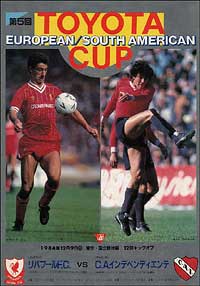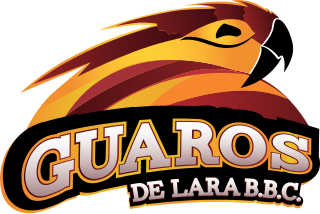The Intercontinental Cup, officially the European/South American Cup and known from 1980 as the Toyota Cup for sponsorship reasons, was an international football competition endorsed by UEFA (Europe) and CONMEBOL, contested between representative clubs from these confederations, usually the winners of the UEFA Champions League and the South American Copa Libertadores. It ran from 1960 to 2004, when it was succeeded by the FIFA Club World Cup, although they both ran concurrently in 2000.
The FIFA Confederations Cup was an international association football tournament for men's national teams, held every four years by FIFA. It was contested by the holders of each of the five continental championships CAF, CONCACAF, CONMEBOL, OFC, and UEFA), along with the current FIFA World Cup holder and the host nation, to bring the number of teams up to eight.
The FIFA Club World Cup is an international men's association football competition organised by the Fédération Internationale de Football Association (FIFA), the sport's global governing body. The competition was first contested in 2000 as the FIFA Club World Championship. It was not held from 2001 to 2004 due to a combination of factors in the cancelled 2001 tournament, most importantly the collapse of FIFA's marketing partner International Sport and Leisure (ISL), but in 2005 it changed to an annual competition through 2023. Following the 2023 edition, the tournament was revamped to a quadrennial competition starting in 2025. Views differ as to the cup's prestige: it struggles to attract interest in most of Europe, and is the object of heated debate in South America.

The United Arab Emirates men's national cricket team is the team that represents the United Arab Emirates in international cricket. They are governed by the Emirates Cricket Board (ECB) which became an Affiliate Member of the International Cricket Council (ICC) in 1989 and an Associate Member the following year. Since 2005, the ICC's headquarters have been located in Dubai.

The Copa Interamericana was an international football competition endorsed by CONCACAF and CONMEBOL. Established in 1969, it was discontinued in 1998 after CONCACAF clubs, particularly those from Mexico, began participating in CONMEBOL competitions. The tournament is projected to return in 2024.
Listed below are the dates and results for the 2002 FIFA World Cup qualification rounds for UEFA teams.

The Copa Rio was an international club football tournament with teams from Europe and South America, having been held on two occasions, in 1951 and 1952, in Brazil. Both editions were organised and endorsed by the Brazilian Sports Confederation, the then Brazilian FA and sports main body. The tournament is often regarded in Brazil as an official tournament, at least as far as the Brazilian clubs are concerned. The name Copa Rio, Portuguese for Rio Cup, was a homage to Rio de Janeiro City. The 1951 edition of the competition was also hailed as "Club World Cup" or "World Champions Cup" by the Brazilian FA and press. Though some previous club competitions may have been hailed as "the club world contest", Copa Rio was the first attempt at creating a Club World Cup with intercontinental reach.

The Ireland men's national field hockey team is organised by Hockey Ireland and represents both the Republic of Ireland and Northern Ireland in international men's field hockey competitions, including the Men's Hockey World Cup and the EuroHockey Nations Championship. They have previously competed in the Men's Intercontinental Cup, the Hockey Champions Challenge, the Men's FIH Hockey World League and the FIH Hockey Series. The team also competes at the Summer Olympics, though it officially only represents the Republic of Ireland then, while still selecting players from the entire island. On 26 January 1895 Ireland played in the first ever international field hockey match when they defeated Wales 3–0 in Rhyl. Ireland were finalists and silver medallists at the 1908 Summer Olympics. Ireland were also bronze medallists at the 2015 Men's EuroHockey Nations Championship.
With 48 continental trophies won, English football clubs are the third-most successful in European football, behind Italy (50) and Spain (67). In the top-tier, the UEFA Champions League, a record six English clubs have won a total of 15 titles and lost a further 11 finals, behind Spanish clubs with 20 and 11, respectively. In the second-tier, the UEFA Europa League, English clubs are third, with nine victories and eight losses in the finals. In the former second-tier UEFA Cup Winners' Cup, English teams won a record eight titles and had a further five finalists. In the non-UEFA organized Inter-Cities Fairs Cup, English clubs provided four winners and four runners-up, the second-most behind Spain with six and three, respectively. In the newly created third-tier UEFA Conference League, English clubs have a joint-record one title so far. In the former fourth-tier UEFA Intertoto Cup, England won four titles and had a further final appearance, placing it fifth in the rankings, although English clubs were notorious for treating the tournament with disdain, either sending "B" squads or withdrawing from it altogether. In the one-off UEFA Super Cup, England has ten winners and ten runners-up, the second-most behind Spain with 17 and 15, respectively.

The 1981 Intercontinental Cup was an association football match between Liverpool of England and Flamengo of Brazil on 13 December 1981 at the National Stadium in Tokyo, Japan. The annual Intercontinental Cup was contested between the winners of the European Cup and Copa Libertadores. Flamengo qualified for the Intercontinental Cup for the first time following their Copa Libertadores Cup success. Liverpool were also appearing in their first Intercontinental Cup. They had declined to take part in 1977 and 1978 after they won the European Cup. On 27 October 2017, following a meeting held in Kolkata, India, the FIFA Council recognised the winners of Intercontinental Cup as world champions.
The 1979 Intercontinental Cup was an association football final played on a two-legged system. It was the last time in the history of the tournament that this format was used before Toyota became the main sponsor in 1980 and a single-game final was held each year in Japan. The final was played between Olimpia Asunción of Paraguay and Malmö FF of Sweden, with Olimpia emerging as the champion after a 3–1 aggregate score win. Malmö FF took its place as the runners-up of the European competition since the European champions Nottingham Forest declined to play the final.
The 1971 Intercontinental Cup was an association football tie held over two legs in December 1971 between the runners-up of the 1970–71 European Cup, Panathinaikos, replacing European Cup winners Ajax which declined to participate, and Nacional, winners of the 1971 Copa Libertadores.

The 1973 Intercontinental Cup was an association football match played on 28 November 1973, between Juventus, runners-up of the 1972–73 European Cup, and Independiente, winners of the 1973 Copa Libertadores. The match was played at the Stadio Olimpico in Rome. It was Juventus' first appearance in the competition and Independiente's fourth appearance after the defeats against Internazionale in 1964 and 1965 and against Ajax in 1972. Despite initially refusing to participate in the competition, Juventus replaced Ajax as the representative UEFA team in the competition after Ajax, as the European champions declined to contest a possible meeting in South America officially for financial reasons. The Cup was played in a single match instead of a two-legged final, as happened in the previous and following years until 1979.

The 1993 Intercontinental Cup was an association football match played on 12 December 1993 between Milan, runners-up of the 1992–93 UEFA Champions League, and São Paulo, winners of the 1993 Copa Libertadores. The match was played at the National Stadium in Tokyo. Milan were making a fifth appearance in the competition, after the victories in 1969, 1989, 1990, and the defeat in 1963. While São Paulo's were looking to defend their title, after victory in the previous edition. Marseille, the winners of 1992–93 UEFA Champions League were not allowed to participate, because of match-fixing scandal involving the club, which saw them stripped from 1992–93 French Division 1 title and banned from international club competitions. Because of the scandal, Milan was allowed to play in both the Super Cup and the Intercontinental Cup.
The Intercontinental Champions' Supercup, commonly referred to as the Intercontinental Supercup or Recopa Intercontinental, was a football competition endorsed by UEFA and CONMEBOL, contested by the past winners of the Intercontinental Cup. The first Intercontinental Cup had been contested in 1960, resulting in a pool of 5 past champions available to contest for the first Intercontinental Supercup, in 1968. The pool increased to 6 past champions for the 1969 Intercontinental Supercup, but the two past champions from UEFA chose not to participate, resulting in the winner of the CONMEBOL preliminary round being declared the Supercup winner. No further competitions were contested thereafter.

The 1984 Intercontinental Cup was an association football match between Liverpool of England and Independiente of Argentina on 9 December 1984 at the National Stadium in Tokyo, Japan, the annual Intercontinental Cup contested between the winners of the Copa Libertadores and European Cup. Independiente were appearing in their sixth Intercontinental Cup, they had won the competition once in 1973 and lost the other four. Liverpool was making their second appearance in the competition, after their loss in 1981.

Guaros de Lara is a Venezuelan professional basketball club, that is based in Barquisimeto, Lara, Venezuela. Guaros de Lara BBC has existed as a club in various different forms since 1983. It has existed in its current form since 2003.

The Associação Bauru Basketball Team, commonly known as Bauru Basquete, is a Brazilian professional basketball team that is based in Bauru, São Paulo, Brazil. The club plays Brazil's top-tier level league, the Novo Basquete Brasil (NBB).

Boca Juniors is an Argentine professional football club based in Buenos Aires. The club first participated in a South American competition in 1919. The first international cup they took part in was the Copa Aldao in which they participated as champions of Argentina. The club competed in AFA/AUF cups from 1919 to 1946 and since entering the Copa Libertadores, in 1963, the club has competed in every CONMEBOL-organized competition, except the Copa CONMEBOL, Intercontinental Champions' Supercup, Suruga Bank Championship, Copa Merconorte, Copa Master de CONMEBOL and Copa Ganadores de Copa, most of them extinct.










